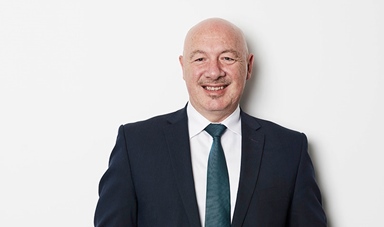Loading component...
At a glance
By Rachael McKinney
Fact File
Joined the organisation: 1989; became CFO in 2012
Based: Melbourne, Australia
Qualifications: CPA; ANZSOG Fellow Program, Bachelor of Business HR & Personnel Administration RMIT (Phillip Institute)
Formerly: Director planning and resources, Rural Health; director business planning and communication, Department of Health, Victoria; director strategic projects, then manager financial operations, Rural Health & Aged Care, Department of Human Services, Victoria
Department of Health and Human Services Victoria: Manages delivery of health and ambulance services, housing, disability and ageing, mental health, families, youth affairs, sport, women and the prevention of family violence
Team: 160 people
Operating budget: The department has an operating budget of A$16.7 billion; Stenton oversees a total budget of A$24.8 billion across the health and human services portfolio
1. Challenge: "Building confidence"
The biggest professional challenge for me was my actual appointment to the CFO position. The size of Victoria’s public service had just been reduced and the whole management team for the finance function in the then health department took voluntary redundancy.
I walked into pretty much an inexperienced team who were managing a budget of about A$12 billion.
I had developed the skills to build confidence in a team, guide people, remain calm, and have the daily conversations needed about how to tackle the critical issues. It was a significant challenge and I didn’t sleep much for a few months, I think.
2. Role: "Identify the risks"
Part of my role as CFO in a government department is to advise the board and relevant ministers on the financial position of the portfolio.
What are the cost risks? What are the strategic sustainability issues? What additional funds do we need to generate from government for the next financial year and the years beyond?
The board is made up of the secretary of Health and Human Services (equivalent to a CEO in a company), and her direct reports.
Above the board are five departmental ministers with various policy and portfolio responsibilities. Operational decision-making happens with the secretary and the board, however policy decision-making happens at ministerial level.
On a day-to-day basis, my job is to understand what budget capacity we have, identify strategic and short-term risks, and develop ways of addressing those risks. I look at how we redirect resources to deal with those issues, either by escalating the problem to government, or managing it within our budget.
There are some issues currently that require us to spend quite a bit of time on operational change, for example, we’re transitioning large parts of the department across to the National Disability Insurance Agency (NDIA), including about A$2 billion in funding back to the federal government.
Other policy imperatives include meeting hospital demands, tackling the flu season, and meeting growing demands in child protection.
A large part of my role is also making sure funds get to the service delivery coalface.
3. Game changers: "Rethinking my career"
Many years ago, when I was running HR systems, a machinery-of-government change brought together the Department of Health and the Department of Human Services.
On the second day of the merger I was called into the boss’s office and told, “There’s an HR systems guy in Human Services, there’s one in Health. I know him, I don’t know you, so he’s going to be the HR systems director”.
It meant I had to suddenly rethink my career direction. I was given the opportunity to start working on process improvement and how we dealt with our funded sector. It was a game changer in that it pushed me more into the finance space.
I needed to develop a new set of skills and learn a lot very quickly, as well as apply project management skills, build a team of people, identify an objective, put in place a project plan and deliver the process change.
4. Passion: "Helping people grow"
I’m passionate about the role of the public servant. Working in government is not about profit; for finance professionals, public service is about making sure every dollar gets spent wisely, and as much as possible goes to service delivery.
I’m passionate about working with people, forming teams, watching and helping people grow. I’m also passionate about understanding how technology can free up time for more added value.
Lessons learned and best advice
Collaborate
You’ve got to learn how to influence and work with others to advance your ideas. Even if you think you know how everything could be done better, you’ve got to have a few tools in your toolbox to get things done.
Balance is the key
When I go home at night, I have to turn my work brain off because the priorities change. Is the person I love talking to me? Are the people I care about doing well? Make sure you keep people in your life who give you balance.
Add value
Knowledge of finance is one thing but it also takes knowledge of the business to find a solution. What’s the problem that people are trying to solve? How would you solve it in their shoes? People are not interested that there’s not enough money for their project; they want to know what you can bring to the table.
Keep perspective
The work that people do in finance may seem dry and boring but in Health and Human Services, the allocation of resources can be life-changing.

